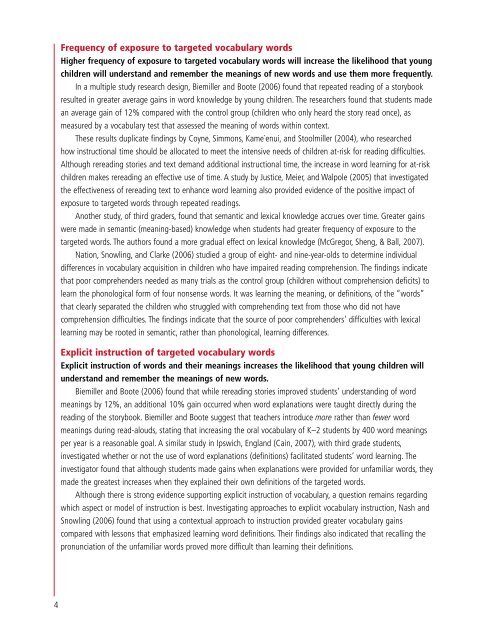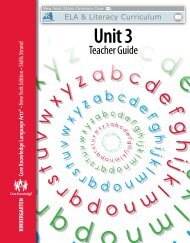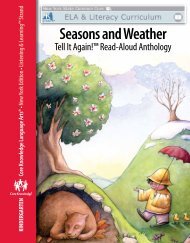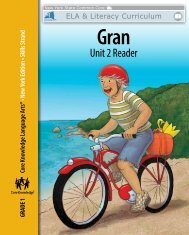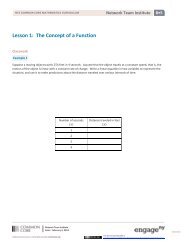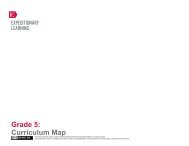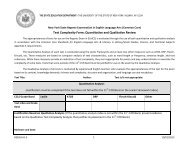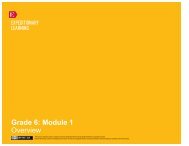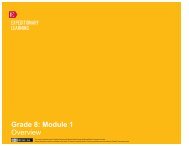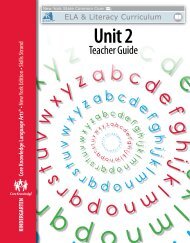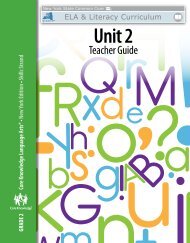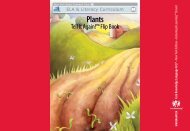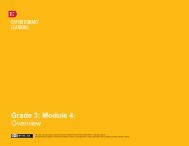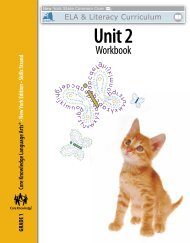A Review of the Current Research on Vocabulary Instruction - U.S. ...
A Review of the Current Research on Vocabulary Instruction - U.S. ...
A Review of the Current Research on Vocabulary Instruction - U.S. ...
You also want an ePaper? Increase the reach of your titles
YUMPU automatically turns print PDFs into web optimized ePapers that Google loves.
Frequency <str<strong>on</strong>g>of</str<strong>on</strong>g> exposure to targeted vocabulary words<br />
Higher frequency <str<strong>on</strong>g>of</str<strong>on</strong>g> exposure to targeted vocabulary words will increase <str<strong>on</strong>g>the</str<strong>on</strong>g> likelihood that young<br />
children will understand and remember <str<strong>on</strong>g>the</str<strong>on</strong>g> meanings <str<strong>on</strong>g>of</str<strong>on</strong>g> new words and use <str<strong>on</strong>g>the</str<strong>on</strong>g>m more frequently.<br />
In a multiple study research design, Biemiller and Boote (2006) found that repeated reading <str<strong>on</strong>g>of</str<strong>on</strong>g> a storybook<br />
resulted in greater average gains in word knowledge by young children. The researchers found that students made<br />
an average gain <str<strong>on</strong>g>of</str<strong>on</strong>g> 12% compared with <str<strong>on</strong>g>the</str<strong>on</strong>g> c<strong>on</strong>trol group (children who <strong>on</strong>ly heard <str<strong>on</strong>g>the</str<strong>on</strong>g> story read <strong>on</strong>ce), as<br />
measured by a vocabulary test that assessed <str<strong>on</strong>g>the</str<strong>on</strong>g> meaning <str<strong>on</strong>g>of</str<strong>on</strong>g> words within c<strong>on</strong>text.<br />
These results duplicate findings by Coyne, Simm<strong>on</strong>s, Kame`enui, and Stoolmiller (2004), who researched<br />
how instructi<strong>on</strong>al time should be allocated to meet <str<strong>on</strong>g>the</str<strong>on</strong>g> intensive needs <str<strong>on</strong>g>of</str<strong>on</strong>g> children at-risk for reading difficulties.<br />
Although rereading stories and text demand additi<strong>on</strong>al instructi<strong>on</strong>al time, <str<strong>on</strong>g>the</str<strong>on</strong>g> increase in word learning for at-risk<br />
children makes rereading an effective use <str<strong>on</strong>g>of</str<strong>on</strong>g> time. A study by Justice, Meier, and Walpole (2005) that investigated<br />
<str<strong>on</strong>g>the</str<strong>on</strong>g> effectiveness <str<strong>on</strong>g>of</str<strong>on</strong>g> rereading text to enhance word learning also provided evidence <str<strong>on</strong>g>of</str<strong>on</strong>g> <str<strong>on</strong>g>the</str<strong>on</strong>g> positive impact <str<strong>on</strong>g>of</str<strong>on</strong>g><br />
exposure to targeted words through repeated readings.<br />
Ano<str<strong>on</strong>g>the</str<strong>on</strong>g>r study, <str<strong>on</strong>g>of</str<strong>on</strong>g> third graders, found that semantic and lexical knowledge accrues over time. Greater gains<br />
were made in semantic (meaning-based) knowledge when students had greater frequency <str<strong>on</strong>g>of</str<strong>on</strong>g> exposure to <str<strong>on</strong>g>the</str<strong>on</strong>g><br />
targeted words. The authors found a more gradual effect <strong>on</strong> lexical knowledge (McGregor, Sheng, & Ball, 2007).<br />
Nati<strong>on</strong>, Snowling, and Clarke (2006) studied a group <str<strong>on</strong>g>of</str<strong>on</strong>g> eight- and nine-year-olds to determine individual<br />
differences in vocabulary acquisiti<strong>on</strong> in children who have impaired reading comprehensi<strong>on</strong>. The findings indicate<br />
that poor comprehenders needed as many trials as <str<strong>on</strong>g>the</str<strong>on</strong>g> c<strong>on</strong>trol group (children without comprehensi<strong>on</strong> deficits) to<br />
learn <str<strong>on</strong>g>the</str<strong>on</strong>g> ph<strong>on</strong>ological form <str<strong>on</strong>g>of</str<strong>on</strong>g> four n<strong>on</strong>sense words. It was learning <str<strong>on</strong>g>the</str<strong>on</strong>g> meaning, or definiti<strong>on</strong>s, <str<strong>on</strong>g>of</str<strong>on</strong>g> <str<strong>on</strong>g>the</str<strong>on</strong>g> “words”<br />
that clearly separated <str<strong>on</strong>g>the</str<strong>on</strong>g> children who struggled with comprehending text from those who did not have<br />
comprehensi<strong>on</strong> difficulties. The findings indicate that <str<strong>on</strong>g>the</str<strong>on</strong>g> source <str<strong>on</strong>g>of</str<strong>on</strong>g> poor comprehenders’ difficulties with lexical<br />
learning may be rooted in semantic, ra<str<strong>on</strong>g>the</str<strong>on</strong>g>r than ph<strong>on</strong>ological, learning differences.<br />
Explicit instructi<strong>on</strong> <str<strong>on</strong>g>of</str<strong>on</strong>g> targeted vocabulary words<br />
Explicit instructi<strong>on</strong> <str<strong>on</strong>g>of</str<strong>on</strong>g> words and <str<strong>on</strong>g>the</str<strong>on</strong>g>ir meanings increases <str<strong>on</strong>g>the</str<strong>on</strong>g> likelihood that young children will<br />
understand and remember <str<strong>on</strong>g>the</str<strong>on</strong>g> meanings <str<strong>on</strong>g>of</str<strong>on</strong>g> new words.<br />
Biemiller and Boote (2006) found that while rereading stories improved students’ understanding <str<strong>on</strong>g>of</str<strong>on</strong>g> word<br />
meanings by 12%, an additi<strong>on</strong>al 10% gain occurred when word explanati<strong>on</strong>s were taught directly during <str<strong>on</strong>g>the</str<strong>on</strong>g><br />
reading <str<strong>on</strong>g>of</str<strong>on</strong>g> <str<strong>on</strong>g>the</str<strong>on</strong>g> storybook. Biemiller and Boote suggest that teachers introduce more ra<str<strong>on</strong>g>the</str<strong>on</strong>g>r than fewer word<br />
meanings during read-alouds, stating that increasing <str<strong>on</strong>g>the</str<strong>on</strong>g> oral vocabulary <str<strong>on</strong>g>of</str<strong>on</strong>g> K–2 students by 400 word meanings<br />
per year is a reas<strong>on</strong>able goal. A similar study in Ipswich, England (Cain, 2007), with third grade students,<br />
investigated whe<str<strong>on</strong>g>the</str<strong>on</strong>g>r or not <str<strong>on</strong>g>the</str<strong>on</strong>g> use <str<strong>on</strong>g>of</str<strong>on</strong>g> word explanati<strong>on</strong>s (definiti<strong>on</strong>s) facilitated students’ word learning. The<br />
investigator found that although students made gains when explanati<strong>on</strong>s were provided for unfamiliar words, <str<strong>on</strong>g>the</str<strong>on</strong>g>y<br />
made <str<strong>on</strong>g>the</str<strong>on</strong>g> greatest increases when <str<strong>on</strong>g>the</str<strong>on</strong>g>y explained <str<strong>on</strong>g>the</str<strong>on</strong>g>ir own definiti<strong>on</strong>s <str<strong>on</strong>g>of</str<strong>on</strong>g> <str<strong>on</strong>g>the</str<strong>on</strong>g> targeted words.<br />
Although <str<strong>on</strong>g>the</str<strong>on</strong>g>re is str<strong>on</strong>g evidence supporting explicit instructi<strong>on</strong> <str<strong>on</strong>g>of</str<strong>on</strong>g> vocabulary, a questi<strong>on</strong> remains regarding<br />
which aspect or model <str<strong>on</strong>g>of</str<strong>on</strong>g> instructi<strong>on</strong> is best. Investigating approaches to explicit vocabulary instructi<strong>on</strong>, Nash and<br />
Snowling (2006) found that using a c<strong>on</strong>textual approach to instructi<strong>on</strong> provided greater vocabulary gains<br />
compared with less<strong>on</strong>s that emphasized learning word definiti<strong>on</strong>s. Their findings also indicated that recalling <str<strong>on</strong>g>the</str<strong>on</strong>g><br />
pr<strong>on</strong>unciati<strong>on</strong> <str<strong>on</strong>g>of</str<strong>on</strong>g> <str<strong>on</strong>g>the</str<strong>on</strong>g> unfamiliar words proved more difficult than learning <str<strong>on</strong>g>the</str<strong>on</strong>g>ir definiti<strong>on</strong>s.<br />
4


